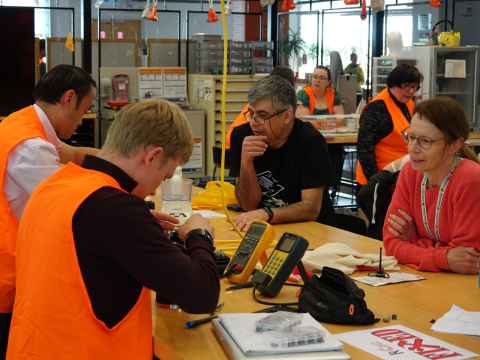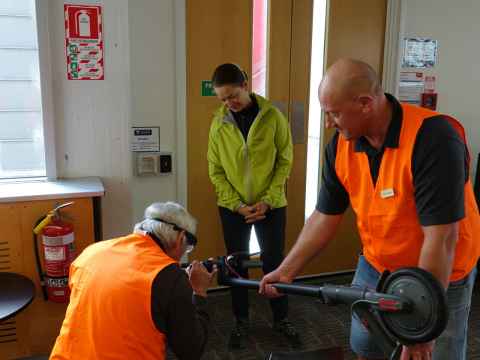Repair cafe a 'huge hit' with 80 percent success rate
17 October 2025
The University's first ever Repair Cafe has shown a strong appetite on campus for fixing items and shifting away from throwaway culture.

Trousers, bags and small electrical appliances were among items brought along to the first-ever Repair Cafe event hosted by Waipapa Taumata Rau, University of Auckland.
Organisers have hailed the initiative, held at the University’s Unleash Space on Friday, 17 October, as a resounding success, with potential to host more events on campus in future.
Approximately 50 students and staff attended the hands-on community event, which saw skilled volunteers work with visitors to diagnose and fix broken household items.
The volunteers successfully repaired about 80 percent of items, including a bicycle, an electric scooter, an electric guitar, and jewellery.
Each successful repair diverts waste from landfill, reduces greenhouse gas emissions and gives items a new lease on life.
The initiative was run in collaboration with Repair Network Aotearoa (RNA) and the University’s Faculty of Engineering and Design Sustainability Committee, the Sustainability Hub, the Circular Innovations Research Centre (CIRCUIT), Ngā Ara Whetū – Centre for Climate, Biodiversity and Society, and the Centre for Innovation and Entrepreneurship.

Associate Professor Maria Armoudian, director of the Sustainability Hub and co-executive director of Ngā Ara Whetū, noted peoples’ emotional responses at having cherished belongings repaired.
"We saw big smiles on people's faces," she says.
"They were very happy to have some of these loved items repaired. They didn't have to part with them or throw them away."
Professor Saeid Baroutian, CIRCUIT executive director and chair of the University’s Engineering and Design Sustainability Committee, says the success was proof that sustainable thinking can be turned into action.
"I also think the interactions people had with our volunteer repairers were really important," he adds.
"People enjoyed learning the design aspects of items, which helps them to be more conscious when purchasing."
Armoudian adds: "If we could just shift how people think a little bit, that’s a huge win."
New Zealand generates over 17 million tonnes of waste each year, with almost 13 million tonnes going to landfill, where decaying organic material releases significant greenhouse gases like methane.

Brigitte Sistig, founder of Repair Network Aotearoa, described the event as a "fantastic collaboration".
She says organisers will now be able to estimate the total waste diverted from landfill, measured in kilograms, along with the greenhouse gas emissions avoided, as a result of the day.
"I’m really grateful that so many people took the opportunity to come along and just get things checked out, and to hopefully expand the lifetime of their belongings."
Baroutian says organisers are now discussing whether the event can become a regular fixture at the University.
The event was held one day before International Repair Day, highlighting a global movement that began in Amsterdam in 2009 and has since spread to more than 40 countries, including New Zealand.
Nationwide surveys, meanwhile, suggest a public appetite for repair.
One recent survey by RNA identified the key challenges that Repair Cafes are designed to overcome: poor knowledge about where to get items repaired, a lack of skills and confidence to undertake repair themselves, and the perception that existing repair services are too expensive.
Media contact
Media adviser | Jogai Bhatt
M: 027 285 9464
E: jogai.bhatt@auckland.ac.nz